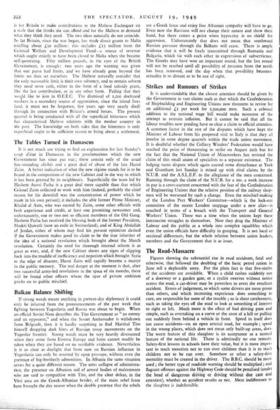The Tables Turned in Damascus
h is not much use trying to find an explanation for last Sunday's coup d'etat in Damascus in the proclamations which the new Government has since put out ; these consist only of the usual fine-sounding clichés and a great deal of abuse of the late Husni Zaim. A better indication of what the new regime stands for is to be found in the composition of the new Cabinet and in the way in which it has been greeted by its neighbours. Superficially the team led by Hashem Atassi Pasha is a great deal more capable than that which Colonel Zaim collected to work with him (indeed, probably the chief reason for his downfall was the concentration of power which he made in his own person); it includes the able former Prime Minister, Khalid al Azm, who was ousted by Zaim, some other officials with both experience and credit, at least one promising newcomer and, unfortunately, one or two not so efficient members of the Old Gang. Hashem Pasha has received the blessing both of the former President, Shukri Quwatli (now an exile in Switzerland), and of King Abdullah of Jordan, either of whom may find his present optimism dashed if the Government makes good its claim to be the true inheritor of the idea of a national revolution which brought about the March revolution. Certainly the need for thorough internal reform is as peat as ever, and, if the new Cabinet shows any signs of slipping back into the muddle of inefficiency and nepotism which brought Syria to the edge of disaster, Husni Zaim will rapidly become a martyr in the public memory. The real danger at the moment is that, after two successful army-led revolutions in the space of six months, there will be found other officers whom the spur of private ambition pricks on to public mischief.


































 Previous page
Previous page